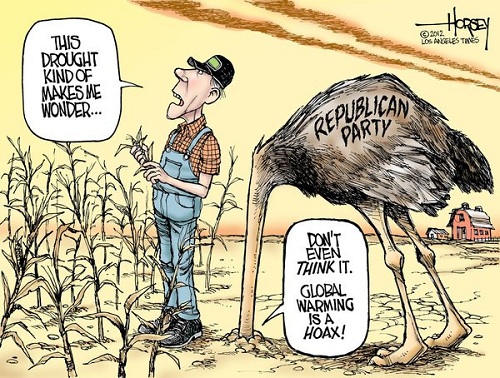2012 SkS Weekly Digest #31
Posted on 6 August 2012 by John Hartz
SkS Highlights
Watts' New Paper - Analysis and Critique by Dana and Kenvin C created a stir amongst SkS readers and generated the largest number of comments of the articles posted during the past week. Given that the Watts' paper was just a rough first draft, it is quite likely that the conversation will continue as the draft is revised and reposted.
Toon of the Week

David Horsey / Los Angeles Times
Quote of the Week
"When I testified before the Senate in the hot summer of 1988, I warned of the kind of future that climate change would bring to us and our planet. I painted a grim picture of the consequences of steadily increasing temperatures, driven by mankind’s use of fossil fuels.
"But I have a confession to make: I was too optimistic.
"My projections about increasing global temperature have been proved true. But I failed to fully explore how quickly that average rise would drive an increase in extreme weather." - James Hansen
Source: Climate change is here — and worse than we thought, Op-ed by James Hansen, Washington Post, Aug 3, 2012
Scientific Term of the Week
Global Warming Potential (GWP) An index, based upon radiative properties of well-mixed greenhouse gases, measuring the radiative forcing of a unit mass of a given well-mixed greenhouse gas in the present-day atmosphere integrated over a chosen time horizon, relative to that of carbon dioxide. The GWP represents the combined effect of the differing times these gases remain in the atmosphere and their relative effectiveness in absorbing outgoing thermal infrared radiation. The Kyoto Protocol is based on GWPs from pulse emissions over a 100-year time frame.
Source: Annex I (Glossary) to Climate Change 2007: Working Group I: The Physical Science Basis, IPCC Fourth Assessment Report.
The Week in Review
A complete listing of the articles posted on SkS during the past week.
- New research from last week 27-30 by Ari Jokimäki
- Surface Temperature Measurements: Time of observation bias and its correction by John Hartz
- BEST Results Consistent with Human-Caused Global Warming by Dana
- Watts' New Paper - Analysis and Critique by Dana & Kevin C
- Is Greenland close to a climate tipping point? by James Wright
- Lindzen's Sandia Talk Contains his Usual Errors by Dana
- New research special - paleoclimate papers 2010-2011 by Ari Jokimäki
Coming Soon
A list of articles that are in the SkS pipeline. Most of these articles, but not necessarily all, will be posted during the week.
- New research from last week 31/2012 (Ari Jokimäki)
- Christy Once Again Misinforms Congress (Dana)
- Pielke Jr and McIntyre Assist Christy's Extreme Weather Obfuscation (Albatross and Dana)
- Nature has invented the ideal method to sequester carbon: coal (Sarah)
- Greenland ice sheet summer temperatures highest in 172 years (Daniel Bailey)
- Global Warming - A Health Warning (Agnostic)
- Skeptic Magazine vs. Heartland and Monckton Cherrypicked Denialism (AlexC and Dana)
- The Continuing Denial of the Scientific Consensus on Climate Change (Andy S)
SkS in the News
Dana and Kevin C's Watts' New Paper - Analysis and Critique was featured on Victor Venema's blog, Variable Variability.
SkS Spotlights
The Finnish Meteorological Institute's mission is to produce high-quality services and scientific know-how on the atmosphere and seas. The Institute uses its expertise to provide services that promote public safety and enhance well-being among people and in the environment, taking into account the needs to maintain preparedness.
The Finnish Meteorological Institute
- observes the physical state, chemical composition and electromagnetic phenomena of the atmosphere
- observes the physical state of the Baltic Sea and the Arctic sea areas.
- operating on the 24/7 principle, produces high-quality information and services about the past, present and future states of the atmosphere and seas
- conducts high-standard research and development in the fields of meteorology, maritime sciences, air quality, space physics and earth observation
- carries out competitive commercial activities, based on expert services, both in Finland and abroad
- plays an active role in national and international cooperation
- actively disseminates information about matters associated with the atmosphere, seas and near space































 Arguments
Arguments























 0
0  0
0






Comments